The BC SPCA is opposed to causing pain or suffering to any animal for recreation, sport or entertainment – this includes rodeos. Rodeos present many risks to animal welfare, but we can take action to prevent animal suffering.
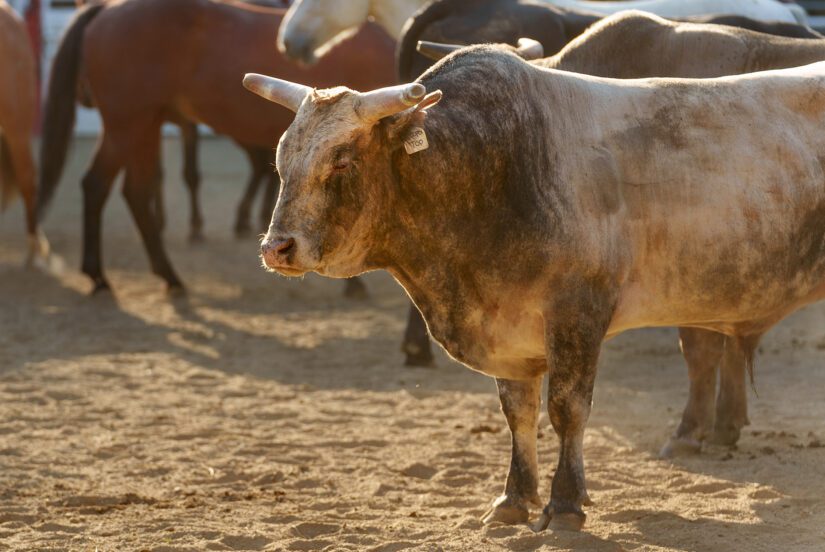
What is rodeo?
Rodeo is a competitive sport that originated from traditional horseback cattle ranching practices. Early rodeo events displayed the practical skills required to operate a ranch. Today’s rodeo has evolved into dramatized events that cause animal suffering for entertainment.
There are seven professional rodeo events in Canada: saddle bronc riding, bareback riding, bull riding, tie-down roping, steer wrestling and ladies’ barrel racing. Other non-professional events may occur at rodeos, such as chuckwagon racing, mutton-busting and wild cow milking.
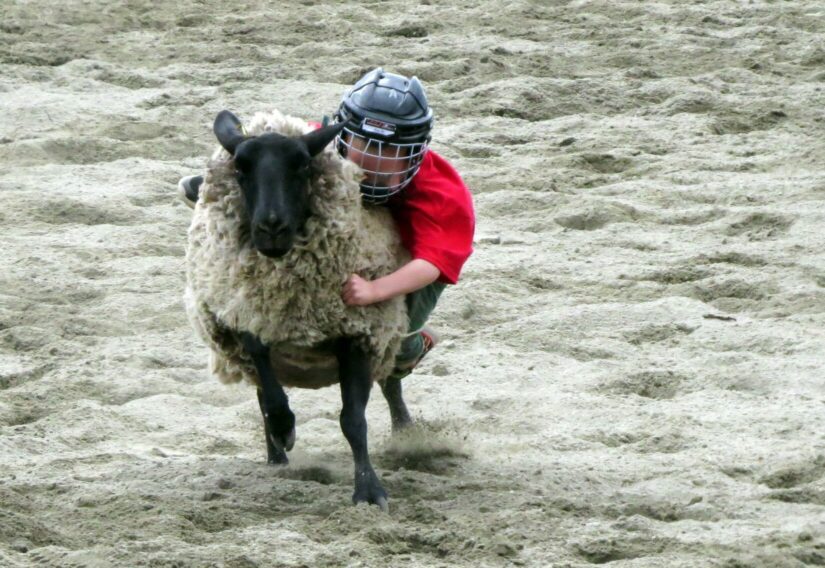
What are the animal welfare issues with rodeos?
Animals used in rodeos face risks to their physical and psychological well-being. Rodeo professionals often say their animals are well-cared for outside of the rodeo. While we support this attentive care, the potential risk of animals experiencing fear, distress, pain, injury and discomfort for entertainment is not justified by the care they receive when not performing.
Fear and distress
In roping and wrestling events, a calf or steer (young cow) is released into the arena and chased on horseback by the contestant(s). This is a very stressful situation for the calf or steer, as cattle are prey animals and will run to attempt to escape.
In the bucking events, a horse or bull is confined in a bucking chute while the contestant prepares to ride. During this time, horses and bulls show many signs of fear and distress, including visible eye white, pawing, kicking, head tossing, and rearing.
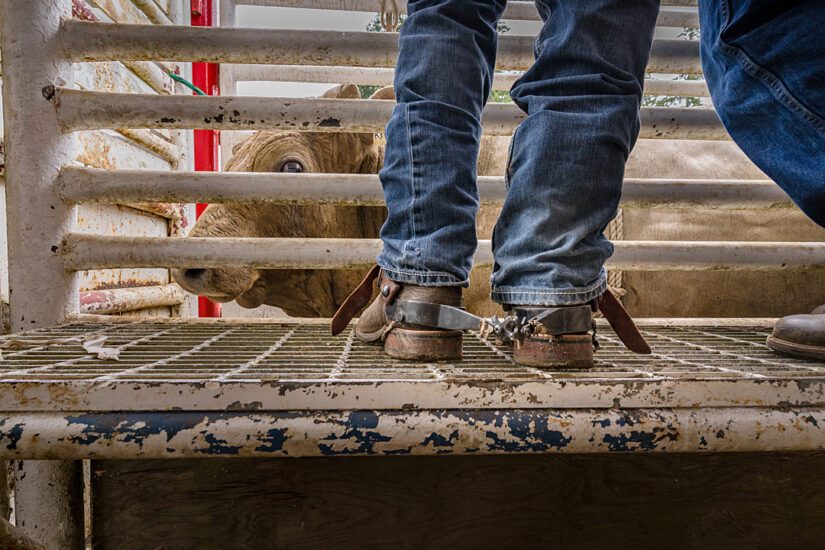
Pain, injury and death
Animals used in rodeo risk suffering from pain, injury and even death every time they enter the arena. Animals can suffer abrasions, bruising, broken ribs, limbs, and necks. Animals have died in rodeo events and have had to be euthanized as a result of their injuries. It’s also important to note that some injuries, such as internal bleeding, may go unnoticed.
Discomfort
Much of the equipment used in rodeo events relies on animal discomfort to produce the desired behaviour.
In the bucking events (saddle bronc, bareback and bull), scoring depends equally on the rider and the animal. The more vigorously an animal bucks, the higher their scoring potential. A flank strap is placed around the animal’s hind end to cause discomfort, encouraging the horse or bull to buck. The rider also uses metal attachments on their boots called spurs to cause discomfort, leading to more bucking. While bucking is a natural behaviour of these animals, in rodeo, it is a behaviour rooted in discomfort, not in play.
Limited standards exist regarding acceptable equipment use in riding events such as barrel racing. Equipment that causes discomfort and pain can be used, such as using harsh bits (metal bars in the mouth) to control the horse. Whipping horses, vigorous kicking and spurs are also common.
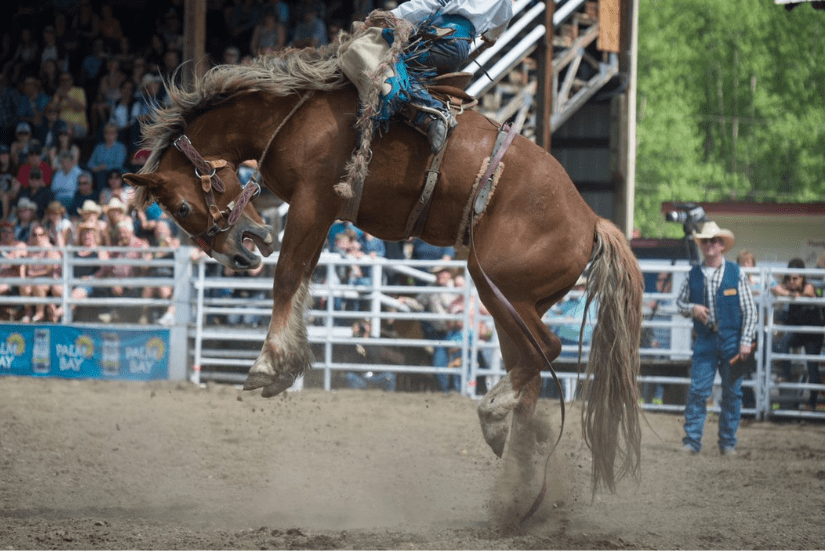
Rough handling
Rodeo events do not reflect best practices for cattle handling or horsemanship. As reflected in their respective Codes of Practice, the agriculture industry stresses the importance of calm, low-stress handling for cattle and horses. Animal handling and training techniques that use pain or fear to motivate behaviour change, common at rodeos, would not be acceptable on cattle farms today.
Status of rodeos in Canada and B.C.
Rodeos are a legal activity that regularly takes place in Canada and B.C. In 2024, the provincial government (through the B.C. Fairs, Festivals and Events Fund) granted $687,000 to support 18 rodeos across the province. While we celebrate the work to revitalize community events that bring people together, support economies, and highlight vibrant cultures, government funding should not be used for events that cause animal suffering.
When the funding program was announced, the BC SPCA wrote to the government, urging them not to provide funding to rodeos. Instead, we encouraged the government to support rural and agri-tourism that celebrates B.C.’s rich agricultural history and the farmers that feed us while promoting respect and kindness for farmed animals. We received no response.
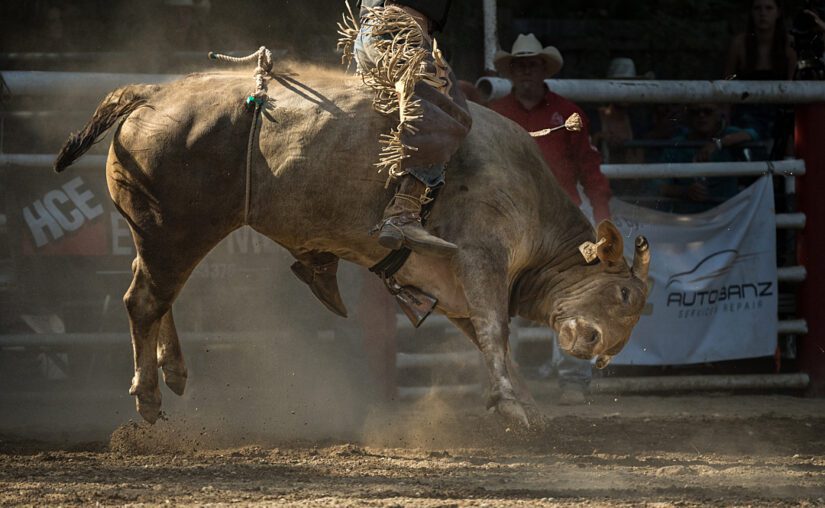
Public opinion
Public polling in 2023 revealed that 65% of British Columbians oppose using animals in rodeos. In 2024, this number grew to 67%.
Additional polling commissioned by the BC SPCA in 2024 revealed that of those who have attended a fair that had rodeo events, 77% would still attend the fair even if it did not have any animal rodeo events*. This shows that Canadians are still interested in attending fairs that celebrate our agricultural history and culture and provide alternate attractions without exploiting animals in the process.
Can rodeo be humane?
In its current form, rodeo is not humane due to the inherent nature of the events. Both the Canadian Professional Rodeo Association and the British Columbia Rodeo Association have rule books that contain standards for the treatment of animals, but the standards are insufficient to protect their wellbeing. The BC SPCA recognizes the province’s ranching traditions, but we believe there are better ways to showcase these skills and this culture.
Where rodeos take place, the BC SPCA encourages showcasing low-stress handling skills and events that do not cause fear, frustration, anxiety, pain or injury to animals.
Read the BC SPCA’s position statement on Animals in Recreation, Sport and Entertainment.
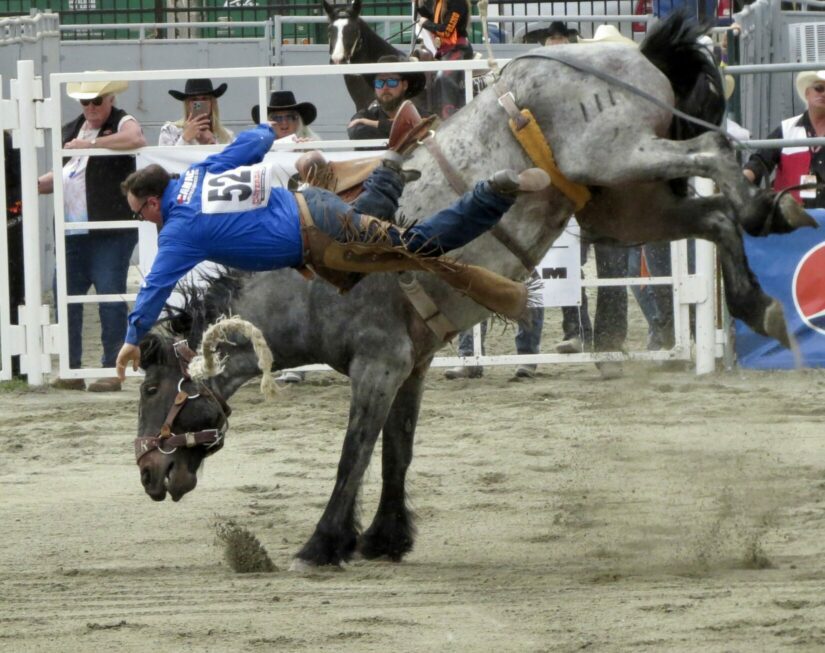
Take action
Our collective voices can show rodeo organizers and all levels of government that animals should not suffer for our entertainment.
- Do not attend rodeos with events that jeopardize the welfare and safety of animals, like calf roping or steer wrestling
- If not already present, reach out to your municipal elected officials and request a bylaw to prohibit rodeos in your community (as done in the District of North Vancouver, Port Moody and Vancouver).
Subscribe to Action Alerts
Want to be the first to know about actions you can take on behalf of animals? Subscribe to receive Action Alerts sent directly to you!
The BC SPCA uses your personal information to update you on our work for animals as well as for advertising and analytics purposes. More information on uses and how to opt-out can be found in our Privacy Policy.
*ResearchCo. Poll conducted for the BC SPCA October 2-4, 2024 (n=1,000 Canadian residents, margin of error +/- 3.1%, 19 times out of 20).
